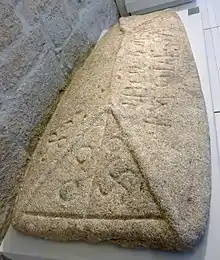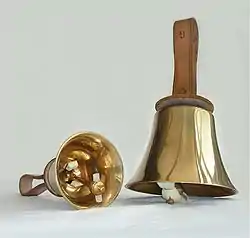campa
Classical Nahuatl
Pronunciation
- IPA(key): /kaːmpa/
Galician

Etymology 1
From Old Galician and Old Portuguese campãa (13th century, Cantigas de Santa Maria), from Late Latin campāna (“bell”), from Latin Campāna, feminine of Campānus (“of Campania”), from Latin Campānia (“a region of Italy in which bronze was produced”), from campus (“open or flat space; plain”). Cognate with Portuguese campa, Spanish campana, Catalan campana, Occitan campana and Italian campana.
Alternative forms
- campá, campán
Pronunciation
- IPA(key): /ˈkampa/
Noun
campa f (plural campas)
- sarcophagus or tomb lid; horizontal tombstone
- 1343, C. Rodríguez Núñez (ed.), "Santa María de Belvís, un convento mendicante femenino en la Baja Edad Media (1305-1400)", Estudios Mindonienses, 5, page 415:
- Et mando meu corpo soterrar enna dita capilla de Santa Maria so a canpaa que hy deitey aa porta dessa cappella
- And I order my body to be buried in the aforementioned chapel of Saint Mary, under the tombstone that I put down at the door of the aforementioned chapel
- Et mando meu corpo soterrar enna dita capilla de Santa Maria so a canpaa que hy deitey aa porta dessa cappella
- 1370, R. Lorenzo (ed.), Crónica troiana. Introducción e texto. A Coruña: Fundación Barrié, page 594:
- Et desí poserõ sóbrelo moymento hũa canpãa dũa pedra muy noble et muy preçada
- And after this they put over the monument a lid made of a very noble and very valuable stone
- Et desí poserõ sóbrelo moymento hũa canpãa dũa pedra muy noble et muy preçada
- Synonym: tampa
- 1343, C. Rodríguez Núñez (ed.), "Santa María de Belvís, un convento mendicante femenino en la Baja Edad Media (1305-1400)", Estudios Mindonienses, 5, page 415:
- bell
- Synonym: sino
Pronunciation
- IPA(key): /ˈkampa/
References
- “campãa” in Dicionario de Dicionarios do galego medieval, SLI - ILGA 2006-2012.
- “campãa” in Xavier Varela Barreiro & Xavier Gómez Guinovart: Corpus Xelmírez - Corpus lingüístico da Galicia medieval. SLI / Grupo TALG / ILG, 2006-2016.
- “campa” in Dicionario de Dicionarios da lingua galega, SLI - ILGA 2006-2013.
- “campa” in Tesouro informatizado da lingua galega. Santiago: ILG.
- “campa” in Álvarez, Rosario (coord.): Tesouro do léxico patrimonial galego e portugués, Santiago de Compostela: Instituto da Lingua Galega.
Irish
Pronunciation
- IPA(key): /ˈkamˠpˠə/
Noun
campa m (genitive singular campa, nominative plural campaí)
Declension
Fourth declension
|
Bare forms
|
Forms with the definite article
|
Derived terms
- campa aclaíochta m (“boot camp”)
- campa an bháis m (“death camp”)
- campa a scaoileadh (“to strike camp”)
- campa a shuí (“to pitch camp”)
- campa coinneála m (“detention camp”)
- campa fóirithinte m (“relief camp”)
- campa géibhinn m (“internment camp, concentration camp, death camp”)
- campa idirthurais m (“transit camp”)
- campáil (“camp, encamp”, intransitive verb)
- campa lae m (“day camp”)
- campa oibre m (“labour camp”)
- campa samhraidh m (“summer camp”)
- campa saoire m (“holiday camp”)
- cathaoir champa f (“camp-chair”)
- dul i gcampa (“to encamp”)
- leaba champa f (“camp-bed”)
- lóncheannaí campa m (“sutler”)
- máistir campa m (“(army) quartermaster”)
- scaoileadh campa m, tógáil campa m (“striking of camp”)
- stól campa m (“camp-stool”)
- tine champa f (“camp-fire, watch-fire”)
Mutation
| Irish mutation | ||
|---|---|---|
| Radical | Lenition | Eclipsis |
| campa | champa | gcampa |
| Note: Some of these forms may be hypothetical. Not every possible mutated form of every word actually occurs. | ||
Further reading
- "campa" in Foclóir Gaeilge-Béarla, An Gúm, 1977, by Niall Ó Dónaill.
- Entries containing “campa” in English-Irish Dictionary, An Gúm, 1959, by Tomás de Bhaldraithe.
- Entries containing “campa” in New English-Irish Dictionary by Foras na Gaeilge.
Italian
Pronunciation
- IPA(key): /ˈkam.pa/
Verb
campa
- inflection of campare:
- third-person singular present indicative
- second-person singular imperative
Portuguese
Etymology 1
From Old Portuguese campãa, from Late Latin campāna (“bell”), from Latin Campāna, feminine of Campānus (“of Campania”), from Campānia (a region of Italy in which bronze was produced), from campus (“open or flat space; plain”). Cognate with Galician campá, Spanish campana, Catalan campana, Occitan campana and Italian campana.
Related terms
- campainha f
- campanário m
Etymology 2
Unknown.
Scottish Gaelic
Pronunciation
- IPA(key): /kʰaumpʰə/
Derived terms
- campa bàis m (“concentration camp”)
Mutation
| Scottish Gaelic mutation | |
|---|---|
| Radical | Lenition |
| campa | champa |
| Note: Some of these forms may be hypothetical. Not every possible mutated form of every word actually occurs. | |

